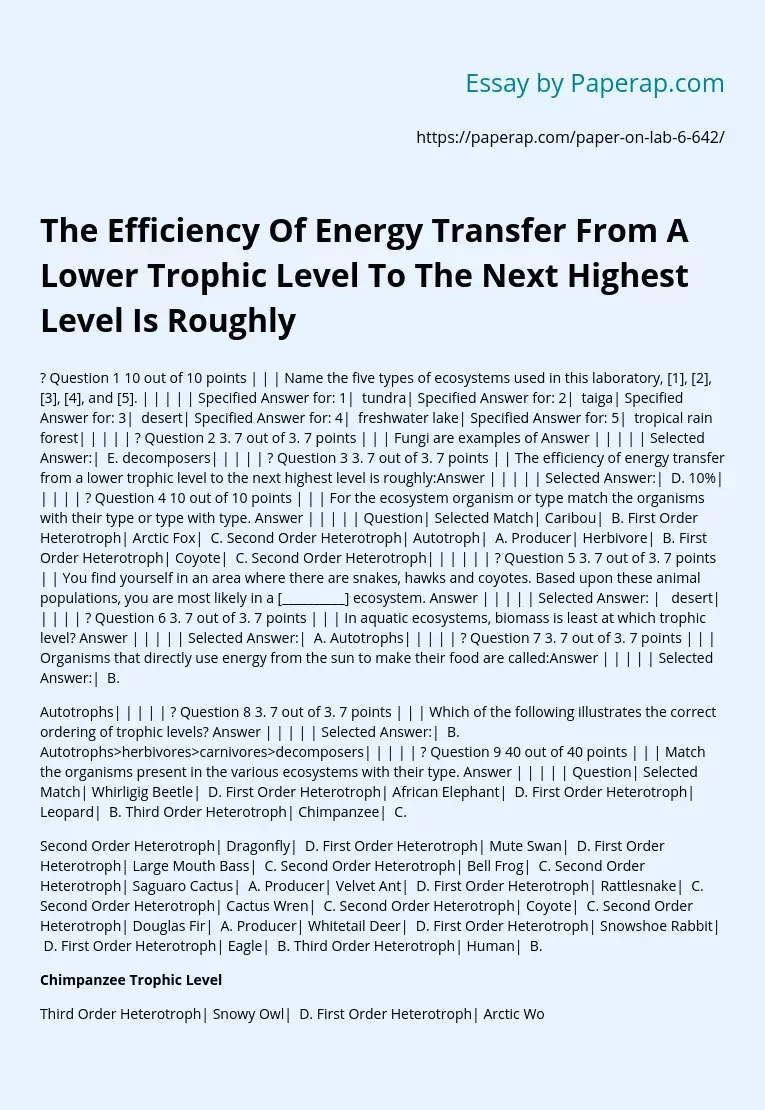Energy transfer efficiency between trophic levels
? Question 1 10 out of 10 points | | | Name the five types of ecosystems used in this laboratory, [1], [2], [3], [4], and [5]. | | | | | Specified Answer for: 1| tundra| Specified Answer for: 2| taiga| Specified Answer for: 3| desert| Specified Answer for: 4| freshwater lake| Specified Answer for: 5| tropical rain forest| | | | | ? Question 2 3. 7 out of 3. 7 points | | | Fungi are examples of Answer | | | | | Selected Answer:| E. decomposers| | | | | ? Question 3 3. 7 out of 3. 7 points | | The efficiency of energy transfer from a lower trophic level to the next highest level is roughly:Answer | | | | | Selected Answer:| D.
10%| | | | | ? Question 4 10 out of 10 points | | | For the ecosystem organism or type match the organisms with their type or type with type. Answer | | | | | Question| Selected Match| Caribou| B. First Order Heterotroph| Arctic Fox| C. Second Order Heterotroph| Autotroph| A. Producer| Herbivore| B. First Order Heterotroph| Coyote| C. Second Order Heterotroph| | | | | | ? Question 5 3. 7 out of 3. 7 points | | You find yourself in an area where there are snakes, hawks and coyotes. Based upon these animal populations, you are most likely in a [__________] ecosystem.
Answer | | | | | Selected Answer: | desert| | | | | ? Question 6 3. 7 out of 3. 7 points | | | In aquatic ecosystems, biomass is least at which trophic level? Answer | | | | | Selected Answer:| A. Autotrophs| | | | | ? Question 7 3. 7 out of 3. 7 points | | | Organisms that directly use energy from the sun to make their food are called:Answer | | | | | Selected Answer:| B.
Autotrophs| | | | | ? Question 8 3. 7 out of 3. 7 points | | | Which of the following illustrates the correct ordering of trophic levels? Answer | | | | | Selected Answer:| B. Autotrophs>herbivores>carnivores>decomposers| | | | | ? Question 9 40 out of 40 points | | | Match the organisms present in the various ecosystems with their type.
Answer | | | | | Question| Selected Match| Whirligig Beetle| D. First Order Heterotroph| African Elephant| D. First Order Heterotroph| Leopard| B. Third Order Heterotroph| Chimpanzee| C.
Second Order Heterotroph| Dragonfly| D. First Order Heterotroph| Mute Swan| D. First Order Heterotroph| Large Mouth Bass| C. Second Order Heterotroph| Bell Frog| C. Second Order Heterotroph| Saguaro Cactus| A. Producer| Velvet Ant| D. First Order Heterotroph| Rattlesnake| C. Second Order Heterotroph| Cactus Wren| C. Second Order Heterotroph| Coyote| C. Second Order Heterotroph| Douglas Fir| A. Producer| Whitetail Deer| D. First Order Heterotroph| Snowshoe Rabbit| D. First Order Heterotroph| Eagle| B. Third Order Heterotroph| Human| B.
Chimpanzee Trophic Level
Third Order Heterotroph| Snowy Owl| D. First Order Heterotroph| Arctic Wolf| B. Third Order Heterotroph| | | | | | ? Question 10 3. 7 out of 3. 7 points | | | You are in an area where there are snowy owl, wolves and caribou. You are most likely in a [___________] ecosystem. Answer | | | | | Selected Answer: | tundra| | | | | ? Question 11 3. 7 out of 3. 7 points | | | This zone has the greatest concentration of plankton in a freshwater lake ecosystem:Answer | | | | | Selected Answer:| A. Limnetic| | | | | ? Question 12 3. 7 out of 3. points | | | Within an ecosystem:Answer | | | | | Selected Answer:| C. Energy flows in one direction only and nutrients are recycled. | | | | | ? Question 13 0 out of 3. 7 points | | | You are in an area where the ground is littered with what appears to be dry, dead leaves. You are most likely in a [x] ecosystem. Answer | | | | | Selected Answer: | coniferous forest| | | | | ? Question 14 3. 7 out of 3. 7 points | | | The ultimate source of energy for most ecosystems is:Answer | | | | | Selected Answer:| B. Sunlight| | | | |
Energy transfer efficiency between trophic levels. (2019, Dec 05). Retrieved from https://paperap.com/paper-on-lab-6-642/

